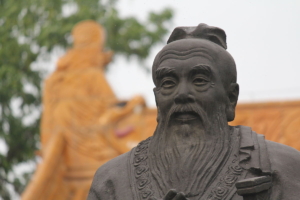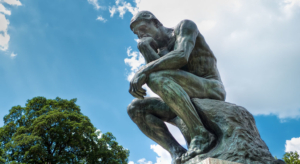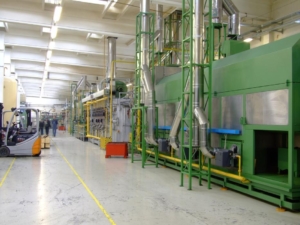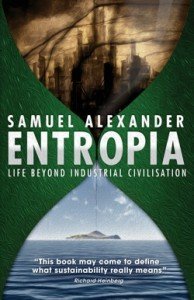Is the Steady State Progressive?
by Brian Snyder
Karl Marx thought of history as progressive, moving from aristocracy to bourgeois capitalism to socialist revolution to communist utopia. While neoclassical economists such as Alan Greenspan and Paul Romer might not agree with Marx on much, they do agree that history tends toward progress. Today, nearly everyone on the political left and much of the political right is “historically progressive,” even if politically conservative. They all seem to believe that our children will inherit a more prosperous, more just world than the one we inherited and that the human flourishing that began with the Renaissance will continue unabated.
Yet I doubt even Marx could look back on the 150 years since his death and see a history of progress. It takes a unique type of optimism to reflect upon a century with two World Wars, a four-decade Cold War, a series of genocides and pogroms, and one of the greatest famines in human history and see a glass half-full. The Soviets and Americans nearly precipitated a nuclear midnight on several occasions, and we blithely see great human progress.
The delusion of progress is made possible by a particular, hedonistic definition of progress and is defensible only in the short term. By most understandings of the meaning of human life other than that of materialistic hedonism, history looks far less progressive.
The Neoclassical Meaning of Life
Oikonomia, the Greek word at the root of economics, refers to the management of one’s household. But if we ponder the management of our domestic affairs, we should start by asking why we intend to manage them.
Imagine yourself a landowner outside of Athens trying to make decisions about your herds and crops. What motivates you? What are you trying to accomplish? What do you want in life? Until those questions are answered, asking about the particulars of your estate will be worthless. Similarly, if we want to conduct a big-picture economic analysis, we first have to know about the purpose of life.
Of course, the meaning of life is subjective and every philosopher has their own answer, none of which need apply to anyone but themselves. But that has not stopped neoclassical economists from adopting one very particular purpose in life, materialistic hedonism. Materialistic hedonism is often called utilitarianism, but I suspect that does more to obscure its meaning than reveal it. Materialistic hedonism is marked by two ideas: happiness is the proper goal of life, and happiness is found in consumption. Both of these are toxic.
First, the idea that happiness is the goal of life—that is, hedonism—is rejected by Eastern and Western religions alike. Buddhism teaches that life is about acceptance. Christians seek to love all others. Hindus strive to achieve all four Purusharthas or aims in life. The Jewish seek to elevate this world in preparation for the next. Muslims live to carry out the will of God. Members of these religions may not always adhere to these purposes, but these are nevertheless the stated purposes of the faithful. Likewise, modern psychologists, especially those prescribing acceptance and commitment therapy, argue that the purpose of life is to live a life of meaning given the fact of suffering, not to try to minimize suffering or maximize pleasure.

Wise Confucius didn’t deify consumption. (Image: CC BY-SA 3.0, Credit: Kevin Smith)
While hedonism is toxic to us and our psychological wellbeing, the materialistic idea that consumption is the means to happiness is also toxic to the environment. This toxicity most often takes the form of pollution, that unavoidable byproduct of consumption that muddies our water and clouds our air. No matter how “green” technology gets, hedonism will continue to produce it at an ever-increasing rate.
Yet given this limited definition of the purpose of life—to maximize pleasure through consumption—history has indeed been progressive in recent centuries, especially in the industrial regions. We certainly consume more than any generation in history, and if we simply assume that this consumption brings us happiness, then we must also be the happiest. Yet, our generation also uses more antidepressants and anti-anxiety pills than any other; we drink, we overeat, use opioids, meth, and other drugs, all to feel something (or nothing). Many of us in the richest and thus happiest nation on Earth need therapy to make it through the week. And despite our affluence, we incarcerate more of our citizens than any other nation on Earth. For the wealthiest and thus happiest people in history, we have a great many problems.
Humanistic Economics and the Meaning of Life
Humanistic economics argues that the quality of life is not measured in the abundance of one’s possessions or even one’s professed happiness. Where neoclassical economics sees utility maximizing agents, humanistic economics sees humans as complex beings with desires and needs that transcend material possessions. Humanistic economics sees needs like belonging, love, community, and meaning, as just as critical to human wellbeing as food, water, and shelter and far more critical than iPhones, SUVs, and trips to the beach.

Assessing progress requires some serious reflection. (Image: CC0 1.0, Credit: Joe DeSousa)
By this standard, history is progressive not if it provides more people with more of the things they don’t need, but rather if it provides more people with the things we cannot live whole, functional lives without. Certainly, we have grown better at fulfilling the world’s material needs over the past several centuries, but we might argue that the USA as a whole has not improved at providing the unquantifiable components of our humanity in the past several decades. We might argue that our minimum-wage jobs no longer provide the meaning that jobs as artisans and craftspeople did several decades ago, that our sense of community has collapsed under the scale of suburbia, that the secularization of our culture has failed to provide belonging, and that our social media addiction has robbed many of our relationships of love.
Or we might argue that in our thirst to meet the excesses of our material wants, we inadvertently crippled our ability to meet our humanistic needs. Most notably, in order to avoid engine knock in our cars, we added lead to the atmosphere, poisoning an estimated 800 million children, increasing the violence of our society and decreasing our children’s intelligence as this lead exposure damaged their brains. All for “progress.”
The preceding might appear pessimistic at first glance, but I see it is an optimistic view of human nature. Neoclassical economics treats human nature as shallow and self-interested, and sees us as quite adept at advancing that shallow self-interest. Humanistic economics treats humanity as creative and deep, yet acknowledges that we struggle to improve our lot.
Ecological Economics and the Concept of Progress
Ecological economics lacks a unified conception of humanity in the way that neoclassical economics conceives of Homo economicus or humanistic economics conceives of Homo sapiens. Several alternatives have been proposed including Homo ecologicus. Yet ecological economists lack a single concept of the purpose of life.
The ecological economist may or may not reject the material hedonism of neoclassical economics, but in either case they would offer a unique critique of “progress.” To the ecological economist we may have gotten better at fulfilling our material wants, and this is not a bad thing. But materialistic hedonism is certainly not sustainable. Whatever material progress we have achieved is due in large part to our use of nature’s capital—especially its soils, fisheries, forests, and fossil fuels—rather than its income. As any corporate accountant would argue, a firm devouring its own capital is destined to fail.
Progress that Matters
So, what would progress that really mattered look like? First, it would be anchored to a worldview that clarified its assumptions about what is important. Our contemporary neoclassical worldview is based on materialistic hedonism, which is not consistent with how the vast majority of people see the world; most people do not think that the quality of one’s life is measured by their stuff, which is why people at funerals rarely recount the deceased beloved’s possessions. Most Americans ascribe to some other worldview—frequently religious, existential, or Platonic—which make different claims about the meaning of life and are just as valid as materialistic hedonism. Pursuant to materialistic hedonism, any consumption is good. However, truly good consumption benefits self and society in the long term; other consumption is frivolous and costly.
Second, progress is only progress if it is not paid for by posterity. Lowering taxes does not constitute progress if it is paid for by borrowing against the future. Likewise, agricultural progress made possible by soil erosion and deforestation are not really progress, nor is providing water by draining aquifers.

Automation and outsourcing are two consequences of materialistic hedonism. (Image: CC0, Credit: Pixy)
Third, progress that matters is not always quantifiable. We have gotten used to quantifying everything and this provides us with an easy way to measure our progress, real or imagined. But it is naïve to think that true human progress is measurable or quantifiable.
Finally, progress might mean moving backward on some fronts. While economic degrowth may be needed, we might also need a broader, more cultural, recession. Note that I do not intend to imply anything about minority, women, or LGBT rights. Instead, I mean that the scale of our society has become too large, too complex, and too global. We have thousands of news sources, almost all of which are less reliable than the handful we had 40 years ago. We can have nearly anything delivered to our door within 24 hours whether we need it or not. We have outsourced every job we can to Asia, and most what we can’t to machines.
I am reminded of the line by William F. Buckley that “a conservative is someone who stands athwart history yelling, ‘Stop!'” But Buckley was no critic of growth and would not have applied his exhortation to economics. I, on the other hand, think it needs to be applied firstly within economics. In fact, we might define a steady stater as someone who stands athwart the economy, yelling “Stop!” Progress is when the economy finally listens.






My thanks for Brian Snyder’s article. I’ve labeled myself as “progressive conservative” and in the second half of Brian’s article, that seems possible. Epicurus offered an alternative to the Hedonists, and instead of materialistic, he was a materialist (believing there was a material explanation for reality). I recall he even predicted the existence of atoms.
He wrote: “Not what we have, but what we enjoy, constitutes our abundance.”
If Brian has a view on Epicurus as the alternative to Hedonism, I’d love to read it.
I don’t think you need to quote Buckley ‘ironically’. Conservative thought is in many ways profoundly more amenable to low/no growth localism than anything on the left -including most green parties. Witness http://www.frontporchrepublic.com (https://www.frontporchrepublic.com) or Joseph Pearce’s follow up to Schumacher’s Small is Beautiful (with Schumacher’s daughter) or Wendell Berry…..or Joseph Pearce in Imaginative Conservative attacking Biden Liberalism this week (https://theimaginativeconservative.org/2021/02/three-pillars-resistance-joseph-pearce.html) ….get past the invective against Biden and Dems and see what he is proposing…. I have put down a few thoughts here http://navigatorsoftheanthropocene.com/localists-and-greens-engaging-with-conservatives-where-to-start/
Thank you Stephen for your thoughts and the links, which I have checked and within which read some of the articles. I’m a long-time fan of Small Is Beautiful. Here in France, I belong to a group called Attac, which proposes to change our way of life, relocalize economies, tax financial transactions. Though I label myself as conservative, in France, all conservative groups are pro-capitalist, pro-war and pro-growth. This is not true on the left, at least with Attac and a few other groups, which are anti-capitalist and within which, Wendell Berry or BF Schumacher would fit better (though critically) than anything on the right. In American politics, I have not found any conservative politician who opposes fossil fuels and favors public services. So following Cornel West, I lend temporary tactical support of neo-liberals against neofascists. I’ve tried my degrowth ideas with both conservatives and Bernie Sanders people. The Sanders people give me a good listen, but the conservatives, even though I consider myself conservative, do not give me the time of day.
Our economic evolution is cultural and political.
While regulators can bring change,
it’s a new social narative that we’re trying to create.
Communism was appropriated by fascism, and implemented as an industrial socialism;
supporting militarisation for imperialism.
A localised socialism would have a globalist agenda;
international cooperation and regulatory standardisation,
then community sharehold of assests,
and a mid-level civic infrastructure for social connectedness
that coordinates the ecological technology that can remunerate households
for the management of natural infrastructure; water, power and soil, and circular resources.
The psychological risk of materialism is consumerism;
the disempowerment and dependancy of identifying in the consumer role.
Localised growth means the reemergence of the artisan in blooming boutique industries;
self-employment and home employment options
and the flexibility to participate in a volunteer workforce towards community plans;
contributing innovation as well as countervailance.
The identity switch is to feeling like a maker and a leader.
The healthy aspect of consumerism is the spiritual ideation of exchange;
what we’ve been consuming is the IDEA of the product,
and the idea of ourselves as a product through our self-identification.
It’s the deceptiveness of our method which brings risk;
with the internet and social activism the narrative shifts
around the safeness of products and industries.
If we’re presented with options to invest in ecological technologies that
reduce household expense, allow for individual expression,
and even bring additional revenue streams,
then a market shift of consumer choice will be a force for transformation.
So the household economy becomes the basis of economics once again.
The steady state agenda would benefit from zero dollar households,
within non profit organisations, as a model for community sufficiency that
builds resilience, security and stability for a robust prosperity.
I have to agree with Brian Snyder’s realistic view. of our progress. I think recent human progress is best described as doing the right thing, after trying everything else. And someone needs to tell supposed economic experts that there is no free lunch or a perpetual motion machine.
“….most people do not think that the quality of one’s life is measured by their stuff….”
What role does the quantity of other people’s stuff play?